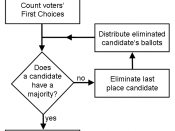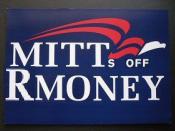Do you think that our country spends too much money on unnecessary projects? Don't you think that there should be alternative ways of doing things that would better suit the population and the economy? Well, San Francisco has solved the problem of costly run-off elections while also upholding the will of the majority of votes. Ranked-choice balloting, a system already used in Australia, Ireland, and London, has been successfully implemented here and should be used throughout the entire country (Inskeep, 2004).
In San Francisco alone runoffs in December 1999 and December 2000 cost well over 2.5 million dollars (Center for Voting and Democracy, 3). This cost reflects two runoffs in one city over a span of two years. Surely, all the money wasted on runoff elections throughout the U.S. could have been put to better use to meet the citizens' needs. It makes one wonder what our country would look like today if all of the money that has been spent on run-off elections had been spent on things such as education, defense, or advancements in technology.
Would our country be in a different position today if that money had been spent on national security or international investigations? Maybe our country would not be at war at this time.
Ranked-choice voting, also called instant runoff voting, would not waste anyone's valuable vote. It allows everyone to pick up to three candidates in order that they wish. The candidate who receives the fewest votes is out of the race, and his/her voters' ballots are examined and their votes given to their perspective second-choice candidate. This process goes on until one candidate receives fifty percent of the vote (Romney, 1). The system that is used today does not use the third party votes after they have been tallied and...


